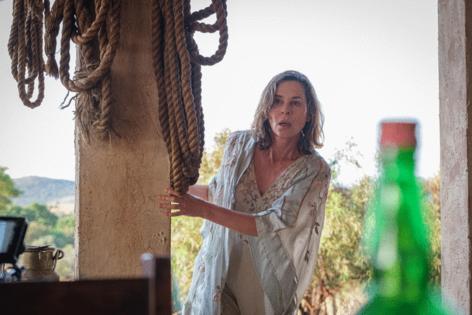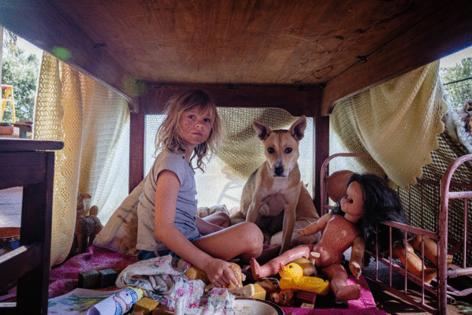'Don't Let's Go to the Dogs Tonight' review: Young actor propels adaptation
Published in Entertainment News
During the last gasp of white colonial rule in Rhodesia (now Zimbabwe), a young girl called Bobo — a lovable Pig-Pen-type, all snarled hair, smudged face and dirty clothes — spends her days driving around the family farm on her motorbike, smoking stolen cigarettes and poking her nose into whatever she can find. Sure, everyone seems armed to the teeth, her mom sleeps with a gun and they have to drive into town with an armed convoy, but that's just the way things are.
And the Africans fighting for self-rule are terrorists, and they could be lurking anywhere. Bobo knows this, because her parents told her so.
With a wonderfully subtle, complex performance, brimming with the certainty and confusion of childhood, South African actor Lexi Venter makes a stunning debut as Bobo in “Don’t Let’s Go to the Dogs Tonight,” the directorial debut of actor Embeth Davidtz.
Davidtz also adapted the screenplay from Alexandra (nickname Bobo) Fuller's 2001 memoir of the same name, and gives an excellent performance as Bobo’s alcoholic, grief-riddled mother, Nicola. But it’s Venter, just 7 years old when the movie was filmed, who provides this film’s beating heart.
Davidtz zooms her story in on the time leading up to Rhodesia’s 1980 election, which would ultimately elect Robert Mugabe as prime minister of the newly established country of Zimbabwe. Because it’s entirely from Bobo’s point of view, the country’s upheaval feels less important than the Fullers’ struggles.
The adults may all be thinking about the election, but Bobo thinks more about the family tragedy that sent her mother spiraling out of control. While her father drives off to fight on the side of Rhodesia’s white government, Bobo isn’t thinking about her country’s sociopolitical climate. She’s playing little-kid mind games with herself; if her father (Rob van Vuuren) turns around to look at her while he’s driving away, that’s proof he loves her.
Most heartbreaking is Bobo’s undeniable love for and simultaneous dismissive treatment of Sarah (the excellent Zikhona Bali), an African woman who works on the Fullers’ farm and sees the coming political future in a way that her employers do not.
The film’s visual landscape is blisteringly bright but often devoid of warmth, the dry, brutal land deeply cared about if not exactly cared for, much like Bobo herself.
The film borders on the solipsism of a memory play, almost like a scene in a snow globe rather than a story with forward motion. But that trapped-in-amber feeling seems appropriate for Bobo, whose entire life has been set against the civil war, which began in 1964.
Because this story is told only through the eyes of a child, we can watch the insidious ways that racism born of colonialism seeps into a country’s psychological groundwater. “Africans turned into terrorists and that’s how the war started,” Bobo says in voice-over, in the sincere, straightforward tone of a child mimicking the adults around her. Simple as that.
The truth is much more complicated, whether it’s the Fullers’ rabid devotion to “their” land, the way the white families casually instruct their Black employees how to vote, or Sarah's inner conflict between caring for Bobo and resenting the family that employs her.
But this film just tells you a story, it doesn’t tell you how to feel about it. Parts of that story may be hard to watch, but, anchored by Venter’s extraordinary performance, it’s not hard to enjoy.
———
'DON’T LET’S GO TO THE DOGS TONIGHT'
3 stars (out of 4)
MPA rating: R (for violent/bloody images, language, sexual assault, and some underage smoking/drinking)
Running time: 1:38
How to watch: In theaters July 11
———
© 2025 The Seattle Times. Visit www.seattletimes.com. Distributed by Tribune Content Agency, LLC.
















Comments